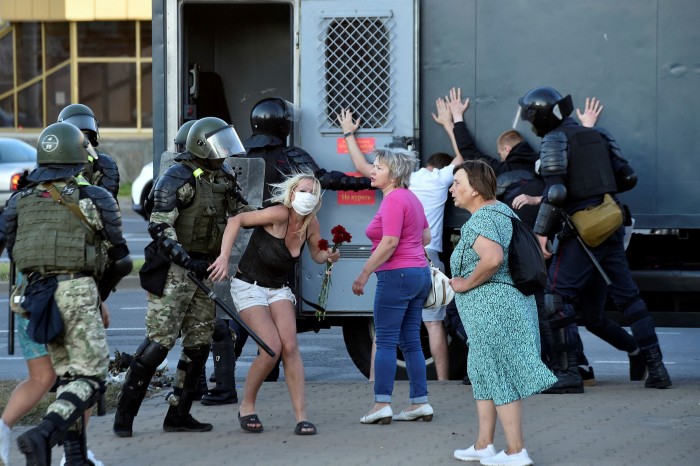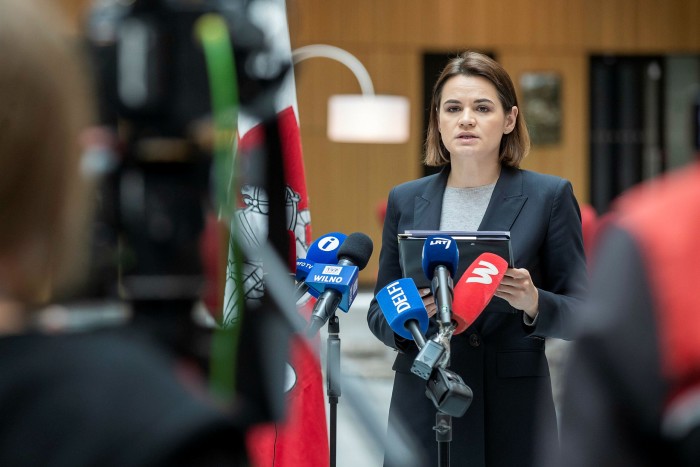[ad_1]
Since deciding to divert an EU commercial plane with a military jet and arrest the opposition activist it carried, President Alexander Lukashenko of Belarus has attracted western outrage and threats of economic sanctions — further isolating the landlocked eastern European country.
On Wednesday, the Belarusian strongman made clear it was all worth it.
Speaking for the first time since the forced landing of Vilnius-bound Ryanair flight 4978 in Minsk and the detentions of blogger Roman Protasevich and his Russian girlfriend, Sofia Sapega, the 66-year-old former collective farm boss warned it was only “a matter of time†before other dissidents abroad would be caught too.
“We know you by sight,†he said.
Lukashenko, who has ruled Belarus for 27 years, was already an international pariah after he declared victory in a disputed election last summer and cracked down on peaceful protests against his regime.
On Tuesday, the EU banned Belarus from the bloc’s airspace and is considering sanctions that could cut off key sectors of its export market. With most land borders closed and the skies over the country now empty, Belarusians have few ways to leave other than through Russia, which has stood by Lukashenko.
But the plane interception underlines that despite international pressure, after months of suppressing protests, Lukashenko is feeling stronger at home, said Maryia Rohava, an Oslo university researcher.
“The fact that they feel they can carry out this sort of atrocious act without fearing the consequences is a sign they feel very secure in the backing of Russia, in their own domestic situation, and in the EU’s lack of credible commitment to imposing the kind of sanctions that would hurt the regime,†she said.
“In the environment in which they function, calculation of the costs was not even part of the puzzle.â€
For a brief moment last August it looked as if Lukashenko’s regime was about to collapse. Hundreds of thousands of people took to the streets every Sunday to protest at the election result, while workers at a factory thought to employ Lukashenko’s political base loudly booed him when he came to make a speech.
Lukashenko determinedly clung to power by tightening control of the media, sending riot police to disperse protests violently, and arresting dissidents, many of whom say they were tortured in custody. By the winter, the weekly protests fizzled out.
Viasna, a Belarusian human rights association, said the country of 9.5m had 421 political prisoners — so many that guards in some detention centres had forced them to wear yellow tags.
“The underlying reasons for these protests have not gone away. The grievances are just as significant as they were,†said Nigel Gould-Davies, a former UK ambassador to Minsk and now senior fellow at the International Institute for Strategic Studies. “It’s just that the authorities at the moment have learnt how to intimidate open and visible manifestations of that discontent.â€
After Protasevich’s arrest, Belarusian authorities leaked videos of the blogger confessing to “organising mass disturbancesâ€, an offence that carries a sentence of up to 15 years in prison. Protasevich’s father told Reuters his son’s nose appeared to be broken and that he believed the admission of guilt had been forced.
Sviatlana Tsikhanouskaya, Belarus’s exiled opposition leader, tweeted that the video of Protasevich and a similar leaked confession by Sapega were “terrifying†and an attempt to “[terrorise] the whole countryâ€.
On Wednesday, in an apparent attempt to intimidate political opponents, Belarusian authorities released footage showing what is thought to be the final hours of dissident Vitold Ashurak’s life. The clip showed the activist, who died on May 21 of unknown causes, alone in a prison cell and unable to stand, collapsing twice face-first.
Dmitry Stakhovsky, an 18-year-old orphan, committed suicide on Tuesday after being charged with similar crimes to Protasevich and blamed “moral pressure†from investigators for his death, according to a note on social media.
“It’s a logical continuation of what we’ve seen in the past few months. Nobody stops the repressions, there’s no reason to, and they continue,†said Artyom Shraibman, a Minsk-based non-resident fellow at the Carnegie Moscow Center. “Society isn’t rising up again and the new sanctions have all been completely unserious so far. So why should he stop?â€
Protasevich’s arrest signified an escalation in Lukashenko’s willingness to pursue dissidents abroad, Shraibman said. Russia’s FSB arrested two opposition figures in Moscow and handed them over to Minsk’s KGB in April. Shortly afterwards, a top Belarusian security official vowed to “find and purge†those responsible for the August protests.
The EU has refused to recognise the election after Lukashenko claimed to have defeated Tsikhanouskaya, who fled to Lithuania under pressure from the KGB.
President Emmanuel Macron of France invited Tsikhanouskaya to attend next month’s G7 summit in London, while the bloc is considering economic sanctions against Belarusian companies and oligarchs from a list compiled by opposition figures.
Hopes of a settlement, however, have been dashed by Russia’s continued support for Lukashenko, who claims western intelligence is destabilising Belarus as a dress rehearsal for “hybrid warfare†against Moscow.
President Vladimir Putin has set aside his strained personal relationship with Lukashenko to offer Belarus billions of dollars in Russian loans and will meet his counterpart in Sochi on Friday.
Though Moscow is believed to be quietly pushing for Lukashenko to step down after he holds a long-delayed constitutional referendum, the Kremlin’s continued support is enough to embolden Lukashenko to snub pressure from the west, according to Shraibman.
Instead, the EU sanctions could “irritate Lukashenko and he might escalate moreâ€, Shraibman said.
“There’s no way he’ll soften his stance without getting Russia involved in the process, or raising the costs of this for Russia. Because for now Lukashenko feels like Russia is backing him up, and he’s doing whatever he feels like.â€
[ad_2]
Source link









